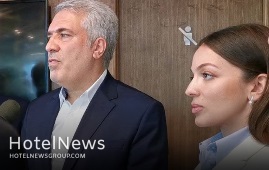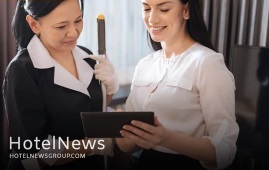
When are groups coming back? This is undoubtedly a question on many hoteliers’ minds, but perhaps the better question is, how are you going to manage operations when they do come back? Right now, the industry is narrowly focused on two central issues – the post-pandemic surge in leisure guests (as epitomized by the concept of ‘revenge travel’) and the labor shortages resulting from so many furloughed staffers permanently leaving the industry (amongst other factors). Both of these matters not only influence the groups segment, but also compound many of their underlying problems. To help navigate the impact of these two issues to realize big revenue gains from the upcoming return of groups, we recruited Steve Anevski, CEO and Co-Founder of Upshift (www.upshift.work), an on-demand staffing platform with the backing of Recruit Holidings (parent company of Indeed). The company has experienced tremendous growth in the past two quarters, particularly as Upshift’s ability to properly vet then deliver high quality shift workers gives hotels the assurance they need to effectively facilitate events once more Revenge Travel for Groups To the first of these concerns, the psychology of revenge travel, in combination with general stir-craziness and what’s dubbed ‘mortality salience’, will compel a tremendous swarm of newly confident leisure guests to venture forth come Q3 2021 based on current vaccination rates and governmental decrees. As we discussed with Anevski, these same compulsions, however, will invariably lead to a swell in groups, albeit following a different pattern than what comprised group travel in 2019. While we can all look enviously at the sold-out rock concerts and rugby matches in Australia, the large-scale, international MICE happenings of yesteryear will take some time to properly come back for the rest of the world. Yet right now, discussions amongst friends of colleagues are already taking place along the lines of, “Hey, we’re all vaccinated now and they’re saying it’s safe to gather in small groups, so let’s start planning something for this fall because we all haven’t seen each other in a long time.” This may not yet be revealed by travel search inquiries or, say, a year-over-year increase in total RFPs for a given territory, but we can nevertheless infer how groups will return. In lieu of conventions, companywide town halls and 200-or-more attendee receptions, think intimate weddings, family reunions, hub-and-spoke hybrid meetings and senior level-only corporate retreats. Importantly, because of the spontaneousness that underpins revenge travel, these smaller group bookings will have vastly shorter lead times from inquiry and contract to actual event date.Managing the Nightmare of Upcoming Events So, let’s list off all the problems that a hotel may encounter in trying to rebuild its group segment in Q3 and Q4 2021: Smaller groups, meaning more management time required to negotiate all of these at the same time then juggle room blocks and coordinate all specific requirements Dire shortages of shift-based labor caused in large part by people leaving the industry as a direct result of the pandemi Drastically shorter lead times for event bookings as groups opt to rush back with something in the near-term and release that pent-up demand New SOPs related to COVID-19 safety, compounding each group’s specific requirements and mandating more team training Inability to bring back many full-time, fixed-cost employees due to the increased carrying debt from a disastrous 2020, the still-depressed revenue on the books and an inability to accurately forecast the shape of an individual hotel’s occupancy recovery Together, these five factors can make hosting an event a nightmare to effectively render (and create a slew of financial headaches if an event isn’t rendered properly) or outright untenable for some properties. To respond to these market conditions, hotels must remain nimble and recruit labor on an as-needed basis much like how revenue managers yield rates in the face of compression. Labor Tech to the Rescue Maintaining a mostly variable labor force in name of being able to accept group bookings creates a critical problem in terms of how to source and motivate these shift workers. That’s where new-age platforms like Upshift come in, where many veteran banquet workers, as Anevski pointed out, have already signed up so that they are more visible and available for hire on-demand. For 2019 and earlier, variable labor demands were addressed by temp agencies. Like so many other aspects of business, though, the pandemic has brought to light the inherent fallacies of these third parties. Notably, temp accountability was always suscept; hotels would receive workers of questionable training and demeanor, and without the ability to validate quality ahead of a given shift. Often, properties would get temps arriving late, entering the FOH entrance instead of BOH, wearing the incorrect uniform, showing up ‘under the weather’ or failing to review the necessary instructions prior to the start of a shift. With the pandemic acting as a proverbial gun to hoteliers’ heads towards the adoption of new platforms to help build a contactless and more personalized guest experience, the legacy issue of putting up with the inadequacies of temp agencies can likewise be solved through a deeper reliance on technology. First is the ability to better manage labor for the coming groups surge and the issue shorter lead times by giving a hotel immediate access to a larger pool of possible hires. Concurrent to this, HR departments would get a palpable productivity boost by using an online portal instead of the old school, paper-and-pen method. Above all, the benefit worth reemphasizing is the heightened accountability. For example, Upshift goes about this through a meticulous prescreening and background check process, combined with a third-strike policy of banning any temp for life from the app should they receive negative feedback three times from a hotel employer. The talent that we have found through Upshift has been outstanding, and it has really allowed us to be proactive as demand continues to shift,” said Chris Cano, General Manager for Columbia Sussex Management. “The transparency, flexibility and financial control I gain through the platform is unique and has been instrumental in controlling costs as we rebound from 2020.” Despite the narrowing of lead times that hotels may see for upcoming groups, the rule still applies that meetings and events are most likely to be initiated internally by planners a full quarter ahead of the desired date. As such, the time to start aligning your property with a wholly digital method of streamlining your temp workers is now. Just as the time to realign operations in advance of the leisure travel surge was this past winter, consider how you plan to pivot for the return of groups later this year. In this sense, using an on-demand labor platform like Upshift will help you to more effectively service any events you get as well as give your team more confidence in its ability to manage groups to help you win more business in the first place.
Create: Jun 13, 2021 Edit: Jun 13, 2021 Waiter
After more than a year of closure following the outbreak of coronavirus, Iran and Turkey have reopened a land border to passengers, ISNA reported on Friday. The Kapikoy-Razi border reopened on May 17 and a group of 41 female Iranian entrepreneurs and artists has recently entered the city of Van in Turkey, where the city’s hoteliers welcomed them with flowers, the report said. Tourists and vehicles are allowed through the border with negative COVID-19 PCR test results issued 72 hours in advance of entry. However, Razi-Kapikoy border from the Iranian side is still closed to tourists, and only diplomats, businessmen, and people who have a residence permit or are studying and living in Turkey are allowed to cross. As Turkey is a country through which many trips of Iranians living abroad and foreign nationals to Iran are made, the coronavirus pandemic prevented several businessmen and students from continuing their activities and even left patients who want to go abroad for further treatment helpless. Some 1.37 million Iranian tourists visited Turkey during the first eight months of 2019, accounting for 4.4% of all international arrivals in the country.
Create: Jun 12, 2021 Edit: Jun 12, 2021 Regional News
Hospitality is built on the development and nurturing of personal relationships, extending beyond interactions with guests to include other hoteliers and even vendor partners. Hotel and resort owners and operators know that it’s not always enough to deliver positive results to customers, sometimes it’s more important to develop a connection with guests when providing service. This mentality can be a challenge for technology partners who have been conditioned by other industries to deliver results without emotion. However, company culture defines the way partners work together, and technology companies can learn a great deal from hospitality’s service-driven ethos. One thing hotel technology partners must be mindful of is the increasing complexity of software used throughout the industry. They should remain patient with operators who are stepping outside of their comfort zones to use technology they are unfamiliar with. Furthermore, many independent chains and boutique hotel groups operate without the benefit of an internal IT department, and for them, it is crucial that the technology supplier be a partner they can rely on to help solve problems in a collaborative and solution based approach. Here are four culture attributes a PMS company must possess to help ensure your hotel’s success: Be AdaptableThe service-oriented nature of hospitality creates an environment where many small-scale changes are taking place industrywide, from adapting to new guest booking patterns to creating new avenues for communication with travelers. In an environment like this, it is important for vendors to be open to receiving constructive criticism to improve service and make the most of current market conditions. Conducting business in the service arena requires some degree of humility, and sometimes well-intentioned efforts can backfire due to the way they were delivered, or other unforeseen factors. Receiving free feedback can be invaluable, whether it comes from an industry consultant or your hotel partners. Opening your offerings up to occasional scrutiny from those who use them every day can help provide inspiration to improve your products and services going forward, and even more effectively navigate your chosen business segment. Be AccessibleTech partners will always struggle with visibility due to the nature of the space they operate in, so it may be necessary to find ways to “walk the floor” with your customers the same way hotel GMs do. Since contact with hotel partners occurs most often when things have gone awry, the most efficient answer to this concern is for tech providers to make it easier for hoteliers to reach them. Direct text chat has seen runaway growth in popularity since the beginning of the pandemic, and it provides several benefits as a means of communication between hotels and tech partners. For one, tech chat allows users to be more deliberate with their messaging, reducing confusion in the long run. Additionally, all communications over text can be easily recorded and shared, helping with future technical issues and assisting with troubleshooting. Lastly, it is the ideal method for sharing e-learning materials, as users can retain them for long-term reference. Be ResourcefulKnowing your customer is everything, so why not consider hiring former hospitality workers for training and support roles? Your technical support personnel are more likely to help resolve customer issues in a reasonable manner if they walked a mile in their shoes. The hotel industry is currently going through a labor crisis, and it is important to make an immediate connection with hotel partners. Former revenue managers, salespeople, and GMs are perfect for these positions as they are fluent in hospitality lingo and already possess the service mindset to help other hoteliers find the solutions to their problems. Hospitality and technology are continually becoming intertwined, and connections such as these will be necessary to sustain future success as the level of complexity in a hotel’s day-to-day business continues to increase. Be HospitableHospitality employees are typically friendly, outgoing, likeable people. Many of them were attracted to hospitality for its focus on people, and the desire to provide a high-quality experience. They love solving problems and making others’ lives easier. Technology providers should strive for the same qualities in our own offerings. If, culturally, your organization’s people are pushing to do a better job every day to better serve customers, and go above and beyond when the opportunity presents itself, they are in the right place.
Create: Jun 9, 2021 Edit: Jun 9, 2021 Hotel Management
International luxury hospitality leader Four Seasons Hotels and Resorts, Tokyo Tatemono Co., Ltd, a developer of condominiums and office buildings, and Hotel Properties Limited (HPL), a Singapore-based real estate company, have announced plans for the One Dojima Project in Osaka, Japan, which will include a brand-new Four Seasons hotel. The One Dojima Project, which began construction on August 1, 2020, is a large-scale redevelopment project in the Kinki region of Osaka. The building will be approximately 195 metres high (49 stories) with a total floor area of approximately 85,000 square metres, making it one of the largest in Osaka City. The high-rise tower will feature residences by Brillia, a meeting hall that serves as a base for tourism and business, and the upcoming Four Seasons Hotel Osaka. The project will contribute to the development of Osaka by creating a new symbol of the city. We appreciate the opportunity to partner with Tokyo Tatemono, one of Japan’s leading real estate companies, on our investment in the One Dojima Project,” says Ong Beng Seng, Managing Director, Hotel Properties Limited. “We look forward to combining the reputation, strength and network of Tokyo Tatemono and Four Seasons Hotels and Resorts, a world-renowned hotel management company, to create an iconic complex development landmark in Osaka – a city that is attracting global attention.” We are honoured to expand our presence in Japan with our long-time partners at HPL and with our new collaborators at Tokyo Tatemono, whose vision for the One Dojima project will create a new luxury lifestyle destination in Osaka,” says John Davison, President and Chief Executive Officer, Four Seasons Hotels and Resorts. “We are proud to be part of the One Dojima project with the upcoming Four Seasons Hotel Osaka, where our guests will soon enjoy the beautiful atmosphere created by local Japanese designers, along with the legendary Four Seasons service that is renowned in Japan and around the world.” Dojima is located near several of the waterways in Osaka City, which is also known as the water capital. The area has developed as a commercial centre since the opening of the Dojima Rice Exchange, the world’s first futures exchange and the origin of trading in Japan. Today, the area has become the centre of business in Osaka. In addition, nearby Nakanoshima is a thriving art district with galleries and the Nakanoshima Art Museum Osaka scheduled to open in February 2022. Dojima is also easily accessible to Umeda, the centre of transportation in Osaka. Fumio Nanjo has been appointed as the art supervisor, and many of the world’s top artists have participated in the project curated by him. Through the development of this high-rise complex, the project aims to promote and vitalise the flow of visitors between Umeda and Nakanoshima with its location directly between the two areas. Four Seasons Hotel Osaka is being created through a collaboration of world-renowned designers and will become a new symbol of Osaka’s ever-growing status as a global city. The 175 guest rooms will boast sophisticated design and a spacious atmosphere. Guests from all over the world will be able to unwind thanks to the highest level of hospitality provided by Four Seasons. Four Seasons Hotel Osaka is being designed by award-winning interior designer Gwenael Nicolas of Curiosity, as well as Shinichiro Ogata of SIMPLICITY, and Yasuhiro Koichi of Design Studio Spin. Nikken Sekkei, one of Japan’s leading architectural firms, has been appointed to design the entire building. Otani, the master architect of Nikken Sekkei, has created a graceful design that evokes the image of a sail. Takenaka Corporation, which used to be headquartered in this area, has been selected to construct the building. Four Seasons Hotel Osaka will complement the brand’s existing properties in Japan, including Four Seasons Hotel Tokyo at Marunouchi, Four Seasons Hotel Tokyo at Otemachi, Four Seasons Hotel Kyoto, and the upcoming Four Seasons Resort Okinawa.
Create: Jun 9, 2021 Edit: Jun 9, 2021 International News
Having unique tourism capabilities, Iran is a safe and desirable travel destination for visitors from around the world, Cultural Heritage, Tourism, and Handicrafts Minister Ali-Asghar Mounesan has said. He made the remarks during a meeting with Russian and Iranian tourism activists in Moscow on Monday. In recent years, Iran’s tourism sector has flourished because new branches of traveling, such as eco-tourism, health tourism, mining tourism, and agritourism, have all been gaining popularity, the minister said. Iran offers an impressive range of tourist attractions, including historical, cultural, and natural monuments, handicrafts, dense forests, towering mountains, roaring rivers, and beautiful deserts, while there are also over 700 museums that can be visited in different cities, he explained. Tourists can find the country to be one of the pocket-friendly destinations in the world, he mentioned. He also noted that some 400 hotels and over 2,000 eco-lodge units have been established across the country. Iran’s image in the world is being tarnished by the U.S.’s anti-Iran policy, but traveling to Iran could change this image for foreign tourists, he added. Mounesan on Monday signed an action plan to implement a bilateral visa-free agreement for tourist groups. The signing of the agreement, which emphasizes a waiver of visas for tourist groups, was due to the good relations between the two countries as well as the interest of Iranians in visiting Russia and the existing capacity in the country for cultural tourists and history buffs, he noted during the signing ceremony. He also expressed hope that the signing of the joint action plan, as well as the process of increasing vaccination and overcoming the corona crisis, would result in a growth of tourism between Iran and Russia. In 2017, Iranian President Hassan Rouhani and his Russian counterpart Vladimir Putin inked a visa-free agreement for tourist groups. A joint technical committee has been developing an action plan for the previously agreed visa-free travel arrangements since then, to put the agreement into effect. Based on the 2017 agreement tour groups of 5 to 50 people heading to [easternmost parts of] Russia from Iran or vice versa are granted a visa-free stay of up to 15 days. Earlier this month, Mostafa Sarvari, who presides over the tourism marketing and advertising office of the Iranian Tour Operators Association, announced many Russian tourists are eager to travel to Iran, recounting his Russian counterparts. “Many [potential] Russian travelers are motivated to visit novel and lesser-known destinations such as Iran that could be a safe and attractive destination,” he said. “According to Russian tourism experts, the feedback from Russian tourists who have traveled to Iran has been very positive, and its reflection, especially on social media, has caused a great deal of enthusiasm and interest.” According to Ebrahim Pourfaraj, who heads the Iranian Tour Operators Association, rounds of negotiations have been held between Iranian tour operators, travel marketers, and their Russian counterparts. “We’ve been commenced talks with some Russian travel agents to put Iranian destinations on their itineraries…. And the Iranian Tour Operators Association has also entered negotiations with Russian unions for outbound tours to attract more travelers from Russia.” Pourfaraj says the majority of potential Russian travelers are unaware of the vast tourist attractions that exist in every corner of Iran. “The fact is that Iran’s political and economic relations with Russia are considered as good, but this has nothing to do with attracting tourists because it is directly connected with the Russian people. It is the Russian people who must choose Iran as their destination.” Iran is taking proactive measures in line with the long-term goal of 20 million tourists by 2025.
Create: Jun 9, 2021 Edit: Jun 9, 2021 Regional News
Iranian Minister of Cultural Heritage, Tourism and Handicrafts, and Head of Russian Federal Agency for Tourism emphasized tourism development between the two countries to remove possible barriers for the tourists. At a meeting on Monday, the two sides called to implementation of tourism agreements between the two countries as soon as possible and remove possible barriers to the tourists from the two countries. Mounesan said: "Facilitating the movement of tourists has been one of the important policies of Iran to calculate the income from it in GDP." Mounesan emphasized Iran moved from historical and cultural tourism to ecotourism because Iran also has eye-catching natural beauties in addition to historical and cultural attractions. The Minister said: "We launched ecotourism and rural and agriculture tourism, and the target countries were also identified. Before Corona, we had 10 million tourists from Iran, 65,000 of whom traveled to Russia. Zarina Doguzova, the head of the Russian Federal Agency for Tourism, also said that it is necessary to increase tourists to the two countries due to the warm relations between the two countries and the excellent tourism capacities. Iranian Minister of Cultural Heritage, Tourism and Handicrafts Ali Asghar Mounesan arrived in Moscow on Sunday to sign a deal on lifting individual visa requirements for tourist groups, Iran’s Ambassador to Russia Kazem Jalali wrote on his Facebook page on Sunday. "Today, Minister of Cultural Heritage, Tourism and Handicrafts Ali Asghar Mounesan is arriving in Moscow to sign an agreement on lifting visa requirements for tourist groups," the ambassador wrote. According to the diplomat, under the deal, tourists of both countries will be able to travel to Iran and Russia through accredited companies, and the entire group will receive one visa. Jalali stressed that tourism is a foundation for developing Iranian-Russian ties.
Create: Jun 8, 2021 Edit: Jun 8, 2021 Regional News
Around 200 people had to be evacuated from a hotel on the outskirts of Madrid that caught fire on Thursday evening, a Madrid emergency spokeswoman said. "No one was injured after an orderly evacuation of the four star Hotel Nuevo Madrid building that was up in flames," the spokeswoman said, adding that the cause of the fire was still unknown. Fifteen fire brigades, ambulances and police patrols arrived at the scene to bring the situation under control. The hotel had caught fire at around 7 p.m. Thursday, causing a huge column of smoke visible from several points in Madrid, the spokeswoman said. Fernando Munilla, a spokesman for Madrid's fire department, said on social media that fire brigades managed to immediately extinguish the flames on the hotel's rooftop. The Hotel Nuevo Madrid hotel is located in north of the city, next to highway M-30.
Create: Jun 7, 2021 Edit: Jun 7, 2021 International News
Iranian President Hassan Rouhani inaugurated several big cultural and tourism projects with 2,537 billion tomans of investment in different parts of the country Thursday. The inauguration ceremony was held through a video conference based in Tehran. The projects which are located in north and west of the country will provide employment for 2,697 people. A five star hotel in the gracious landscape of Heiran as well as renovation project of Amjad palace in Talesh both located in the northern province of Gilan are among the projects inaugurated today. 33 Renovation projects together with two major tourism centers in western province of Lorestan were also officially opened by President Rouhani today. At the ceremony, the president appreciated good efforts made to boost tourism industry. Also, he hoped that tourism would enter new conditions after public vaccination slated for final months of the Iranian calendar year which started on March 21. At his remarks, the president referred to return of 2,723 Iranian historical works and antiques from US and Europe to the country during past eight years. As he stressed, such return was kind of fulfillment of the Iranian people's rights. Every week, the president opens several important projects on petrochemicals, oil, industry, tourism, sports, infrastructure, development and health to follow goals behind "Surge in Production" which is the name of the past Iranian year (March 20, 2020- March 20, 2021) declared by the Supreme Leader.
Create: May 28, 2021 Edit: May 28, 2021 Regional News
HNI, [۲۶.۰۵.۲۱ ۱۱:۴۱]Hotel technology exists to amplify, not burden, a hotel’s guest experience. Truly guest-centric technology should empower hoteliers to deliver their unique and ideal version of the guest experience. But great hotel technology should not only be guest-focused, it must also be management-focused, by helping hotels scale their business, and staff focused by facilitating operations, streamlining communications, and promoting employee productivity. In the face of a post-pandemic labor crunch, hotels need a mobile and guest-centric PMS to support a lean staff as they look to meet an uptick in travel demand. 2021 Will See the Hospitality Industry Roaring Back… But Hiring Still Lags BehindThe COVID-19 pandemic was devastating for hospitality, setting the industry back over 10 years in terms of occupancy and job losses. According to the ALHA, the pandemic cost the U.S. hospitality industry over 50% occupancy, and over 3.1 million jobs. The good news, however, is that the industry is on the verge of a major recovery. Rising vaccination rates, coupled with rapidly falling case numbers have led to an increase in confidence with the traveling public. According to Destination Analysts,confidence in travel safety is increasing, with over 61.8% of American respondents confident that the pandemic situation will continue to improve, and over 72% of the respondents making travel plans in the previous week. This rising optimism is being seen in job reports indicating that the hospitality sector gained over 331,000 jobs in April 2021 一 the sixth largest gain in the past 50 years. Unfortunately, these gains may not be enough. U.S. hotels are still 600,000 workers short of pre-pandemic levels, but workers don’t seem to be filling the vacancies. This can be attributed to a number of factors, including widespread health concerns, difficulty obtaining childcare, and the recent rise in federal unemployment benefits. The question for hotels is how can they leverage technology to support a lean staff, get new staff up to speed quickly, and help their current employees better engage with and serve their guests, without the burden of physical or technological constraints. PMS Technology Should be Intuitive, Mobile, and Unburden StaffHoteliers joined the hospitality industry because they delight in serving their guests 一 not because they wanted to fight with outdated technology. If hotels want to retain high-performing employees, they should invest in technology that actively empowers them to deliver an exceptional guest experience. What does it mean to have a staff-focused PMS? On the most basic level, PMS platforms should be intuitive and easy to use, and never burden employees when serving their guests. When technology is delivered through an intuitive user interface, hoteliers can spend less time buried in their screens, and more time actively engaging with their guests. Additionally, mobile & guest-centric PMS technology should promote maximum ease of access. Hoteliers should be able to manage their property from any location and device, giving them the freedom to move about the hotel and meet guests wherever they are. This allows staff to have more natural and personalized interactions with their guests, while also freeing any staff member, no matter their specific job title, to help any guest in any section of the hotel. Easy-to-Train On Systems Enable Hotels to Expand their Talent PoolPMS platforms should be easy to train on and easy to master. When technology is easier to understand, hotels can hire staff based on how they actually interact with guests 一 not how well they “get” outdated technology. When a new staff member is hired, it should be easier to train and onboard them to the new technology, thereby increasing adoption throughout your team. HNI, [۲۶.۰۵.۲۱ ۱۱:۴۱]When investing in new PMS technology, hoteliers should also explore what resources the vendor offers in terms of staff training and support. The right PMS technology vendor will view its relationship with its clients as a long-term strategic partnership, and will make sure its clients’ staff have the resources they need to get the most out of their product. Look for a dedicated implementation team, with the option for either in-person or remote implementation, as well as a dedicated client success manager (CSM), who can act as the customer’s voice within the organization. The right PMS vendor will provide robust self-training resources, including a comprehensive product knowledge base, on-demand e-learning courses, and best practice materials which demonstrate how to use the product to enhance the guest journey and operational efficiencies. Mobile Communication Can Streamline Operations and Improve Staff MoraleBreakdowns in team communication can easily lead to breakdowns in team morale. When hoteliers communicate with walkie-talkies and landline telephones, critical information can get lost in the shuffle, resulting in dissatisfied guests and frayed team dynamics. A mobile, guest-centric PMS can streamline staff and guest communications in a number of ways: Instant room updates automatically notify front desk staff when a room is ready or out of order, while analytic dashboards can keep your entire staff updated on key performance metrics. For more sophisticated forms of communication, native-cloud PMS systems can integrate with third-party guest messenger platforms. Guest messaging delivers seamless communication throughout the guest journey using common messaging platforms such as SMS, Facebook Messenger or WeChat. This allows guests to communicate instantly with staff through their mobile device, while also allowing staff members to serve multiple guests through multiple chat windows. Use Advanced Automation to Get the Most Out of a Limited Staf The hospitality industry is facing increased travel demand and heightened expectations for cleanliness and service, as it moves into the peak 2021 summer travel season. Unfortunately, they are still hampered by limitations in resources and staff size. By incorporating robust automation, a mobile PMS can help hotels get the most out of limited staff, while also freeing hoteliers from many of the mundane, repetitive tasks that take them away from their guests. A native-cloud PMS can automate simple but repetitive tasks such as room assignment, bulk check-in, and housekeeping task management. But it can also automate more advanced processes 一 like the entire check-in experience. Guests can have the option of checking in through their mobile device or a guest-facing smart kiosk. Mobile self check-in can not only streamline and personalize the check-in experience for guests, it can free hotel staff from engaging in repetitive and scripted dialogues during the check-in process. This self check-in option can also include automated targeted offers for amenities and room upgrades, giving the hotel an additional stream of ancillary revenue. Instead, they can focus on more natural and personalized interactions, like answering questions about dining options, or greeting guests with tea or champagne in the lobby. Great Technology Should Empower Great HoteliersIn order to succeed in the post-pandemic hospitality market, hotels have to deliver exceptional and personalized service on a limited staff. Therefore, it’s crucial that they invest in technology which is not only guest-centric but staff-centric as well. A mobile, guest-centric PMS delivers on both of these goals, by leveraging a system that is easy to use and easy to learn, while facilitating both staff communication and streamlined operations. Great technology should empower both hoteliers and their employees to deliver the best guest experience possible. And a guest-centric PMS can help them do just that.
Create: May 26, 2021 Edit: May 26, 2021 Hotel Management
Preliminary work of collecting data about Karaj-Chalus road, its associated structures, and nearby villages has been commenced by the tourism directorate of Alborz province to have the scenic road registered on Iran’s national heritage list. Based on follow-up field visits and preliminary investigations, it was decided to develop a dossier for the national registration Karaj-Chalus road as a historical, cultural, and natural route that has considerable potential in the field of tourism, CHTN quoted the provincial tourism directorate as saying on Monday. Natural landscapes, villages with historical texture, the architecture of different periods, local food, traditional clothing, and the original Karaji dialect are among the attractions of the Karaj-Chalus axis, a provincial official said. In connection with political geography, the Karaj-Chalous road was once the most important route and connection of the southern slopes of Alborz to the northern regions of the country. As a piece of history, Chalus Road, also less well known as Road 59, was constructed during the Qajar era by the local people with very primitive hand tools. The 160 km road crossing and crawling up the Alborz Mountains offers beautiful landscapes, waterfalls, and springs. Each season presents its own special beauty along the road. The mesmerizing view changes as one travels on Chalus; from trees lining up on both sides of the pavement to getting engulfed and surrounded by the Alborz, and sometimes have dramatic views of the Karaj River, which runs along part of the road. The road between Tehran and the Caspian Sea has become a destination in itself for many Tehranis who take it just to escape the hustle and bustle of the city or for a relaxing day out with family and friends.
Create: May 26, 2021 Edit: May 26, 2021 Regional News
Cultural Heritage, Tourism and Handicrafts Minister Ali-Asghar Mounesan on Monday inaugurated a traditional restaurant during his visit to Sari, the capital of the northern Mazandaran province. Constructed in a piece of land covering 834 square meters in area, the traditional restaurant is expected to generate 18 job opportunities, CHTN reported. The minister was scheduled to inaugurate 78 tourism-related projects -- virtually or in-person -- during his two-day visit to the northern province, the report added. Last year, Iran joined an online campaign launched by the World Tourism Organization (UNWTO) to promote gastronomy as an essential part of tourism. Experts say that food is not merely an organic product with biochemical compositions. For members of each community, food is defined as a cultural element. The Iranian cuisine, usually embellished with fragrant herbs, varies from region to region, however, it principally accentuates freshness, deliciousness, and colorfulness. Dizi (a lamb, chickpea, and potato stew made to a centuries-old recipe), fesenjoon (chicken poached in an earthy sweet-and-sour sauce of ground walnuts and pomegranates) are amongst the most popular traditional dishes of the country. Traditional Iranian dishes are usually not overpowered with spices though kitchens are embraced with ranges of subtle and yet contrasting flavors such as a combination of sweet and sour or mild. Stretched along the Caspian Sea and Alborz mountain range, Mazandaran is a popular destination for domestic holidaymakers and it is home to more than 3500 villages and rural areas.
Create: May 26, 2021 Edit: May 26, 2021 Regional News
Predicting the return of corporate travel would be a cinch if foretelling the future was foolproof. No one, however, has that extraordinary prescience and even if they did, the future is, at best, murky. The continuing popularity of work-from-home arrangements, the COVID-19 induced reluctance of both individuals and companies to get back out on the road, and issues throughout the travel supply chain are all converging to create a less-than-hospitable environment for individual business travelers. “Before you get corporate travel back, you have to get people back to the office,” said Daniel Lesser, President and CEO of LW Hospitality Advisors. “It’s going to be a bit of a slog, at least until Labor Day.” Among the short-term problems, he continued, is airline flight capacity. “A lot of it will have to do with air lift. Carriers are being careful about yield management,” he said. However, Lesser added, “The summer is going to be phenomenal [for leisure travel] but the rubber will hit the road after in terms of group and corporate business.” Shifting BusinessLWHA’s COO and Principal Evan Weiss sees an even more dramatic delay on the horizon. “At the beginning, I thought the recovery would come first with leisure business, then leisure group, corporate transient and then corporate group,” he said. “But there’s been a paradigm shift. Companies now can cut back their travel by, for example, having two in-person board meetings and two on Zoom.” He continued, “After leisure, which is certainly back, we’re thinking corporate groups will be next to come back, and then corporate transient business.” That creates problems for hoteliers. In the U.S., the corporate average room rate in February 2020—the last full month before the coronavirus squeezed the life out of most of the global hotel industry—was $175.15. A year later, it stood at $111.03, down 35.6% year-over-year, according to HotStats data. In Europe, in February 2021, the corporate rate was €77.30, down 35.2% YOY. Meanwhile, in China, corporate travel didn’t have the dramatic swoon seen in other parts of the world. Its lowest point was in April 2020, when the corporate rate hit $65.65, a 24.8% YOY decline. As of April 2021, the $73.03 corporate rate was up 11.2% on the year prior, but still 16% lower than April 2019. The absence of corporate travel is equally disadvantageous since road warriors are typically higher-spending guests than their leisure counterparts. “Corporate folk pay at the last minute, then they book the Ritz-Carlton, and they’re often the ones who drink the most. If you lose that, it’s problematic,” Weiss said. But Chris Green, CEO of third-party management company Chesapeake Hospitality, has a rosier outlook on the return of corporate, framing it in the context of the domino effect. “Once a big player like Bank of America or Deloitte says ‘As long as you’re vaccinated and feel comfortable, you can travel,’ then it’s off to the races,” he said. “I believe companies will say ‘If you’re in a client-facing role, you have to get out there.’” Still, some timid travelers could remain skittish if they don’t feel safe and comfortable back at a hotel, Green noted, meaning properties must get the word out on the extraordinary efforts being taken to keep COVID-19 at bay. To do so, Chesapeake is “asking key questions about traveler confidence and experience and then using responses in sales and marketing presentations,” said Green. The company also is encouraging guests to share their experiences on travel-review sites. “We’re cleaner, safer and more sanitized than we’ve ever been,” Green said. “That needs to be the front-facing message because companies must feel certain that the hotels where they’re putting travelers are good citizens.”
Create: May 25, 2021 Edit: May 25, 2021 Hotel Management
